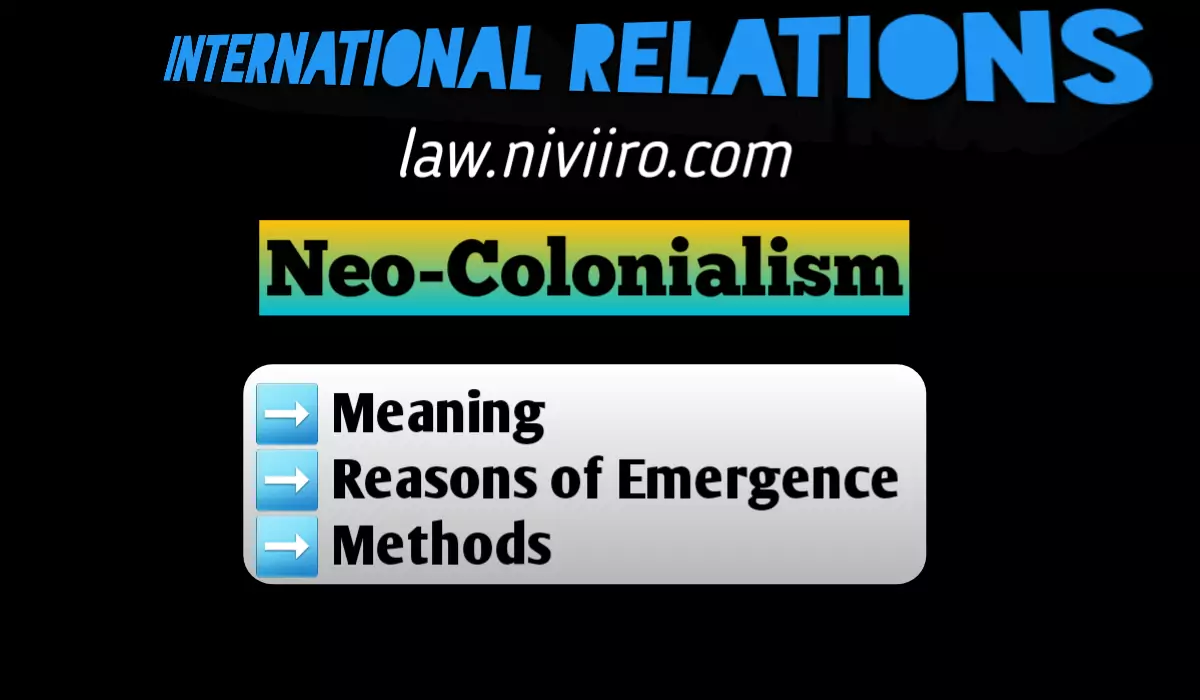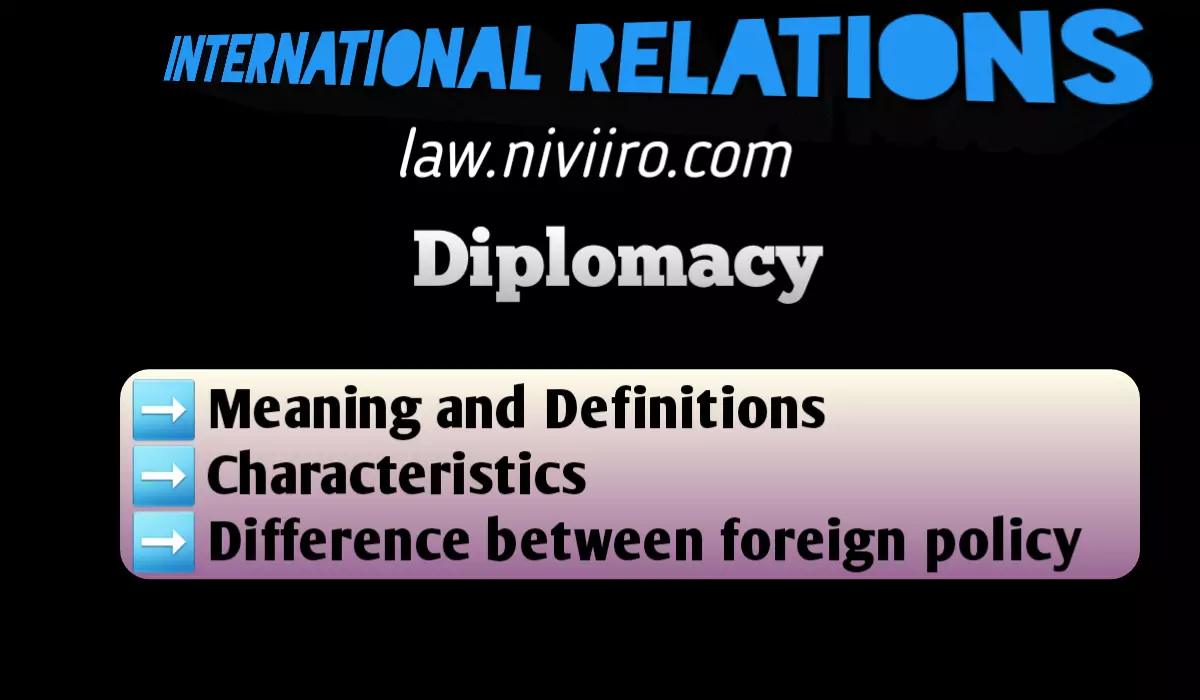International Relations – The study of political and social systems, including state relations and the notion of international law, may be traced back to ancient Greece, when the study of political and social systems, including state relations and the concept of international law, began to take shape. The current field of International Relations, on the other hand, evolved in the early twentieth century, partly in response to the devastation of World War I. The term “International” was for the first time used by Jeremy Bentham in the later part of eighteen century.
Meaning and Definitions of International Relations
Meaning – It is a branch of poltical science that defines how to interact with other states. the term international relations also defined as officials relations between the soverign states. However some scholars include economic, social and cultural relations in it.
Definition –
- As per Padelford and Lincoln, “International Relations is the interaction of states policies within the changing patterns of power relationships.”
- According to Trygve Mathiesen, international relations embrace, “all kinds of relations traversing state boundaries, no matter whether they are of an economic, legal, political or any other character, whether they be private or official, and “all human behaviour originating on one side of a state boundary and affecting human behaviour on the other side of the boundary”
Definitions of International politics
- According to Palmer and Perkins, “International politics is essentially concerned with the state system.”
- Robert Strausz Hape and Stefan Possony say that “the actions of citizens and the decisions of politically significant private groups determine the field of international politics.” Thus, international politics is a process of constant interaction among nations in which every nation tries to prompt its own interest in contrast to others by means of its policies and actions.
- According to Norman Padelford and George Lincoln, “The interaction of state-policies within the changing patterns of power relationships constitutes international politics
- Prof Hans J. Morgenthau says, “International politics is the unending struggle for, and use of, power among nations.”
- As per Thomson, “International politics is the study of rivalry among nations and the conditions and institutions which ameliorate or exacerbate these relationships.”
Special Features of International Relations
Here are some key features of International Relations:
International Relations is the study of relations between sovereign nations and other actors in the international system, such as international organisations, multinational enterprises, and non-state actors such as non-governmental organisations (NGOs).
Norms and Institutions: The study of norms and institutions such as international law, human rights, and the United Nations is also part of international relations. These norms and institutions influence state conduct and serve as a foundation for cooperation and conflict resolution.
Conflict and Cooperation: The study of conflict and cooperation between nations and other actors in the international system is central to international relations. Conflict resolution and peacebuilding are also major aspects of the field.
Power: The study of power, both in terms of military capability and economic resources, is a common theme in international relations. Power can be utilised to influence other states and international players.
Anarchy: When there is a lack of centralised authority in the international system, states must rely on their own resources and power to achieve their objectives.
Interdependence: The international system is growing more interdependent, which means that states and players are more linked and dependent on one another than ever before.
Global Issues: Global concerns that transcend state boundaries, such as climate change, terrorism, and pandemics, are frequently addressed in international relations. These difficulties necessitate a multidisciplinary approach that includes economics, political science, sociology, and other disciplines.
Importance or Significance of Study International Relations
- Also, learning about international relations can help people realise that nationalism is not always a good thing. Abused or overblown nationalism might pose a greater threat to international harmony and unification.
- We may investigate the fundamental motives that drive states’ behaviour in the world, how they go about achieving these goals, and the resources that ultimately determine whether they succeed or fail.
- The understanding of issues related to collective security and disarmament is further bolstered by studying international relations.
- It offers a strategy that third-world nations might use to establish their own nations. It fosters the sense of global brotherhood necessary for the advancement of humanity within the international society.
- The motto of “live and let live’ has achieved considerable popularity in the international relations.
- The study of international relations has shown that the idea of sovereignty is no longer relevant. It fosters belief in the ability of society as a whole to solve issues.
- It emphasises how collaboration over conflict is crucial for the advancement of transportation, communication, and the economy in the current atomic age.
- International relations gained its importance due to its explaining the reasons for war between different states; factors for the establishment of peace; outbreak of wars and their end; and the nature of wars in the past, present and future. It explains the foreign policies of the major and smaller states.
Related Post
Meaning of International Relations ?
It is a branch of poltical science that defines how to interact with other states. the term international relations also defined as officials relations between the soverign states. However some scholars include economic, social and cultural relations in it.
Define International Relations ?
Definition – As per Padelford and Lincoln, “International Relations is the interaction of states policies within the changing patterns of power relationships.”
Definitions of International politics ?
According to Palmer and Perkins, “International politics is essentially concerned with the state system.”
What are the Special Features of International Relations ?
Power: The study of power, both in terms of military capability and economic resources, is a common theme in international relations. Power can be utilised to influence other states and international players.
Anarchy: When there is a lack of centralised authority in the international system, states must rely on their own resources and power to achieve their objectives.
Interdependence: The international system is growing more interdependent, which means that states and players are more linked and dependent on one another than ever before…..
Importance or Significance of Study International Relations ?
1. Also, learning about international relations can help people realise that nationalism is not always a good thing. Abused or overblown nationalism might pose a greater threat to international harmony and unification.
2. We may investigate the fundamental motives that drive states’ behaviour in the world, how they go about achieving these goals, and the resources that ultimately determine whether they succeed or fail……..
Reference Books
- H.J. Morgantheau – Politics among Nations
- International Relations in the 21st Century by Pant
- Raymond Aron – Peace and war a theory of International Relations
- J.C. Johari – International Politics
- An Introduction to International Relations by John Baylis, Steve Smith and Patricia Owens.
- Prem Arora – International Relations and foreign policy

















